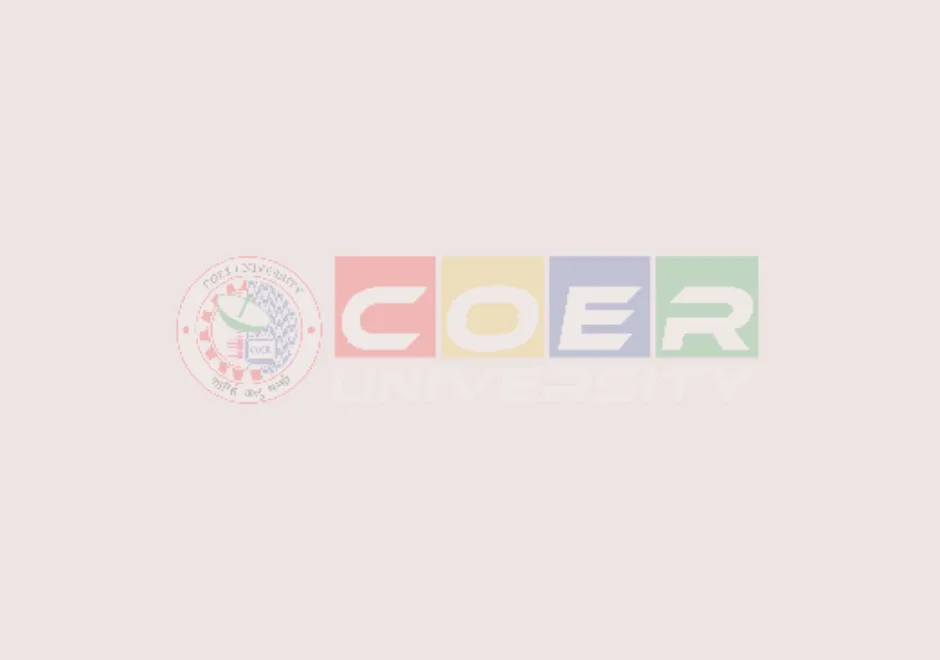
Master of Science (M.Sc.) in Renewable Energy
Duration
2 Years
Eligibility Criteria
Bachelor's Degree in Material Science/ Material Engineering/ Metallurgical Engineering/ Chemical Engineering/ Physics/ Chemistry or related discipline with a minimum of 55% marks

The M.Sc. in Renewable Energy typically offers a curriculum tailored to provide students with comprehensive knowledge and skills in various aspects of renewable energy technologies and their applications. After this course, students can understand and take an opportunity to work on the following areas of green energy. Renewable Energy Fundamentals, Solar Energy Systems, Wind Energy Technologies, Biomass and Bioenergy, Hydropower and Ocean Energy, Energy Policy and Economics, Energy Storage and Grid Integration, Sustainable Energy Management, Renewable Energy Project Development, Research Projects in Renewable Energy:
Apply NowCurriculum
-
Quantum Mechanics
-
Statistical Mechanics
-
Physics of Materials
-
Crystallography and Crystal Growth
-
Fundamental of MS office
-
Foundation of Professional Development
-
IPR (MOOC)
-
Polymers Physics
-
Hydrogen Energy and Fuel Cell Technology
-
Solar Photovoltaics
-
Data Analysis and Computational Techniques
-
AI for Multidisciplinary
-
Material Synthesis lab -I
-
Data Analysis and Computational Techniques Lab
-
Analytical Thinking & Problem Solving Skills
-
Energy Storage
-
Solar Thermal Energy
-
Wind Energy Conversion Systems
-
Solar Energy Materials
-
Fundamentals of IoT
-
Materials Synthesis lab-II
-
Paper/Book/Chapter/Patent
-
Advanced Energy Systems
-
Energy Policies and Energy Management
-
Optimization Techniques
-
Research Project/ Dissertation
Program Objectives POs
-
POs 1
Scientific knowledge: Apply fundamental knowledge of physical sciences along with specializations to solve complex scientific problems.
-
POs 2
Critical Thinking: Analyze complex scientific problems critically, apply independent judgement for synthesizing information to make intellectual and creative advances for conducting research in a wider theoretical and practical context.
-
POs 3
Problem Solving: Conceptualize and solve scientific problems, evaluate a wide range of potential solutions for those problems and arrive at feasible and optimal solution after considering public health and safety, cultural, societal and environmental factors in the core areas of expertise.
-
POs 4
Research Skill: Extract information pertinent to scientific problems through literature survey and conducting experiments, apply appropriate research methodology, technique and tools for the development of scientific/technological knowledge in one or more domains of science.
-
POs 5
Advanced Technological Proficiency: Create, select, learn and apply appropriate techniques, modern scientific & IT tools including prediction and modelling to complex scientific activities.
-
POs 6
Collaborative and Multidisciplinary work: Contribute positively to collaborative- multidisciplinary scientific research, demonstrate a capacity for self-management and teamwork, decision-making based on open-mindedness.
-
POs 7
Communication Competence: Communicate effectively on complex scientific activities with the science community and with society at large such as being able to comprehend and write effective reports, design documentation and present effectively.
-
POs 8
Environment and Sustainability: Understand the impact of the professional scientific solutions in the societal and environmental contexts and demonstrate the knowledge of science need for sustainable developments.
-
POs 9
Ethical Practices and Social Responsibility: Acquire professional and intellectual integrity, professional code of conduct, ethics of research, consideration of the impact of research outcomes on professional practices and an understanding of responsibility for sustainable development of society.
-
POs 10
Independent and Reflective Learning: Observe and examine critically the outcomes of one’s action, make corrective measures subsequently and learn from mistakes.
Program Educational Objectives PEOs
-
PEOs 1
Application Level: To groom candidate with a solid foundation in fundamentals and advanced Physics to impart knowledge on preparation, processing, characterization and modelling.
-
PEOs 2
Research and Innovation: candidate will be equipped with the skills necessary to conduct independent research and contribute to the advancement of scientific knowledge. They will be capable of developing innovative solutions and methodologies, contributing to academic, industrial, and governmental research initiatives
-
PEOs 3
Professional and Ethical Leadership: Candidate will demonstrate professional and ethical attitude, effective communication skills, teamwork skills, multidisciplinary approach and an ability to relate scientific aspects to broader social context
Programme Specific Outcome PSOs
-
PSOs 1
Renewable Energy Fundamentals: Students will possess an understanding of renewable energy sources such as solar, wind, hydro, biomass, and geothermal energy, including their characteristics, potentials, and limitations.
-
PSOs 2
Innovation and Research: Students will engage in research to innovate and improve renewable energy technologies, addressing challenges such as efficiency enhancement, cost reduction, and environmental impact mitigation.
-
PSOs 3
Interdisciplinary Collaboration: Students will collaborate effectively with professionals from diverse fields including engineering, economics, environmental science to develop holistic solutions for renewable energy deployment and integration.









